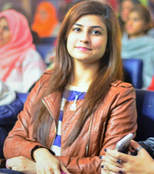|
By Iqra Naveed
It is an undeniable fact that science is intertwined with every domain of life on earth. Hence, it is imperative to effectively communicate science to the layman. As a result, science writers come into limelight for the purpose of educating their audience about science with utmost clarity. It is not easy to become a commendable science writer but provided the right direction and with a lot of practice, one can achieve it. So, Hamza and I had the honor to speak to Marcia Bartusiak who helped us gain some insights into her life as a science writer.
Marcia Bartusiak is an author, journalist and a Professor of Science Writing at Massachusetts Institute of Technology (MIT). She has been writing about Physics and Astronomy for nearly four decades and has won many prestigious awards.
Question: You are a celebrated science writer and also a Professor of Science Writing at MIT. Please tell us what makes a good science writer. Answer: That’s a wide-ranging question, but I think you have to have a basic curiosity to be a good science writer. Having a degree in science is not a requirement for this field, but you must know how to ask good questions. And like any effective journalist, you must be able to generate compelling story ideas. The hardest thing is to find a good story. It’s easy to contact a magazine and say you want to write about dark matter, for example. But the challenge is to find a focus. Perhaps you could find a scientist carrying out an experiment, maybe with a new and interesting approach; you could then inform the audience about dark matter through the eyes of this scientist. Moreover, you want to humanize the story, making it more engaging to the audience. Question: You started out as a communications graduate. What encouraged you to enter the domain of science writing? Answer: My background is a bit unusual. When I was in high school, I was into so many things. I loved writing, science, and politics! So, I thought an undergraduate degree in journalism would enable me to bring all three of these interests together. That’s why I first majored in journalism. After I got my undergraduate degree, I worked for four years as a broadcast journalist, and that is when I realized that I was most excited covering science. So, I quit my job, went back to school, and took science courses—at first merely to help further my knowledge in that area. But, doing well, I had some wonderful professors who encouraged me to get a graduate degree. I chose physics because I simply loved the subject. Physics allows you to see how nature ultimately works. Upon getting my master’s degree, I actually contemplated going into the field, but after doing some freelance science writing and getting an internship with Science News magazine, I decided to go back to writing. My first fulltime job in the field was at Discover magazine, and from there I went freelance. I’ve been doing freelance writing now for more than thirty years. Question: Over the course of time, what do you think, how the opportunities for women to work in science have increased? Answer: When I first started out, there were a few women in the United States covering physics and astronomy. That has changed completely over the last forty years. Women have now flocked into science writing. I meet them at conferences all the time. I’m now the grand old lady. They’re covering health, medicine, engineering, and the physical sciences. As for women working in science itself, the opportunities have certainly expanded here in the United States over the past decades. Women are now making valuable contributions in both the theoretical and experimental sciences. But, unfortunately, women here are still in the minority, at least in the areas of physics and engineering, unlike in Italy, where there are as many women physicists as men physicists. I hope, over time, this situation changes. Question: What is the most exciting part of working as a science writer? Answer: The most exciting thing is being able to stick my nose into so many areas of physics and astronomy. I’m never bored. I always had an interest in astronomy, ever since I was a little girl. That’s why I was drawn to writing about that field. If I had continued in science,I would have been studying one small area. But as a science writer, I’ve been able to talk to all kinds of researchers--radio astronomers, optical astronomers, particle physicists, theorists, and cosmologists and many more. I get to write about all these varied topics. It’s as if I’m in the thick of the field itself. Being able to talk to productive scientists, engage with them, and visit their observatories… it’s all a wonderful part of my career. Question: You have written a whole corpus of books; how does it feel interpreting science and technology for the layman? Answer: I feel immensely gratified when people provide feedback on my writing, telling me that my explanations opened up a new world for them. That’s what keeps me going. My whole purpose of combining my two passions - writing and science - is to reach out and see people’s eyes light up; the thought that “I’m getting a feel for it, even if I haven’t taken the course myself.” Question: Based on your experience as a science writer, how do you view the balance in simplicity, the freedom in creativity, and accuracy in communicating science through creative writing? Answer: It’s a tough balance. For me, the number one priority is accuracy. I want everything I write to be as accurate as possible, within the constraints of my analogies and metaphors. Then I allow myself the creativity and freedom to find a way to maintain this accuracy, while still engaging the audience. After my first draft, with all the facts in place, I’ll focus on the story itself, making sure it’s a compelling narrative. If I worry that some of my metaphors may be misleading to a general reader, I will often go back to my sources to get their viewpoint and see what changes can be made to maintain accuracy. It’s a major consideration in science writing, to maintain that fine balance between creative writing and accuracy. Very good question! Question: At a time when science and technology are producing incredible things at an incredible pace, how does a science writer stay on top of her field? Answer: It’s tougher now. When I started in the 1980’s, I had the luxury of going to the library. This was before the dawn of the internet, and I would leisurely peruse the journals to find story ideas. Now, you have a flood of information coming at you every day, practically every single hour over the web. I had considerably more time to think about stories than my students now do. I was also working for publications that had a monthly schedule. We had a few weeks to work on a feature or news items. Now, websites or publications may demand that you produce a news article in a matter of hours. Only for the longer feature articles, you still have time to think and ponder, like the time when I was starting out. What helps in this situation is specializing in a specific area of science, as I did with astronomy and astrophysics—because the more you write, the better you get at covering that field. Not only that, you gain expertise and garner a list of sources with whom you are able to maintain contact. They’re usually happy to answer questions and clarify any concepts related to their field. Specializing in a chosen area helps in this faster-paced world of journalism. Question: People often confuse science writing with scholarly writing; how do you explain the difference between the two? Answer: Sometime when I tell people I’m a science writer, they think that I’m a technical writer, writing handbooks or for scientific journals. I generally tell people that I’m a reporter, just like any other journalist writing for a general audience. But instead of covering business, arts, or politics, I’m covering science. While explaining the technical details of the science, I’m also telling you a story. Scholarly writings, on the other hand, are written for the specialists in the field. Science writing helped bring her love of physics, politics, arts, and journalism together, under one roof. Marcia Bartusiak suggests keeping your ears open at all times in search of a potential story. For people who have an immense interest in science but do not want to get confined to a particular field, science writing is a good career option as it satisfies that quench for gaining a wide-ranging perspective on different areas of science. Lastly, science writing should meet the needs of the community by providing scientific knowledge in a simple and compelling way, rather than wrapping it up in technical jargon. 
About the Author
Iqra Naveed is a sophomore in computer engineering at the University of Engineering and Technology, Lahore. She has recently developed interest in science communication and aims at bridging the gap between science and art. She is interested in undertaking science-art projects. Her hobbies include painting, sketching, reading and playing the guitar. Comments? Leave them below! |
Archives
February 2023
DiscovHER BlogScientista DiscovHER is a blog dedicated to discovHERies made by women in science. Follow us for links to the latest resHERch! Categories
All Alexandra Brumberg Amy Chan Avneet Soin Chemistry Diana Crow Engineering Health/medicine Indulekha Karunakaran Iqra Naveed Johanna Weker Lidiya Angelova Michael Clausen Mind Brain And Behavior Muhammad Hamza Waseem Nikarika Vattikonda Opinion Prishita Maheshwari-Aplin Technology Uma Chandrasekaran |
The Network for Pre-Professional Women in Science and Engineering
The Scientista Foundation is a registered 501(c)(3) -- Donate!


 RSS Feed
RSS Feed